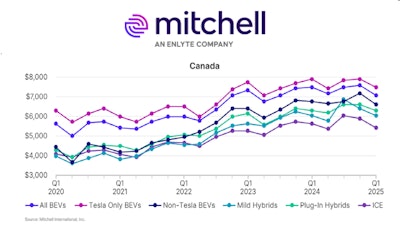
Toronto, Ontario -- A new report from Mitchell International examines the impact the Trump administration's tariffs will have on electric vehicle sales.
In a report called Plugged-In: EV collision insight, the company reveals that EV sales remained robust during the first quarter of 2025, accounting for nine percent of new vehicle sales in the U.S. and 10 percent in Canada — the introduction of new tariffs is likely to drive people back toward fossil fuel vehicles because of rising components and assembly costs.
While other vehicle prices will rise, these added costs are particularly burdensome for EV manufacturers. It is likely companies will review pricing strategies and supply chain dynamics as a result of them.
Despite these looming trade hurdles, the frequency of collision claims for repairable EVs continued to rise, reaching 3.12 percent in the U.S. and 4.48 percent in Canada for Q1 2025.
Interestingly, while the number of claims increased, the average severity of these claims saw a decrease — down 10 percent in the U.S. to $5,927 and seven percent in Canada to $7,026. This suggests that while EVs are getting into more fender benders, the cost to fix them is slightly easing, perhaps due to improved repair processes or parts availability.
However, the report also highlights that nearly 11 percent of all collision-damaged EVs were declared total losses, mirroring the total loss frequency for traditional fossil fuel vehicles. This parity indicates that, despite their advanced technology, EVs are just as susceptible to being written off after accidents as their gasoline-powered counterparts.
One aspect pushing up the price of EV repair is the lack of third-party parts. When repairing traditional vehicles, Canadian collision facilities use aftermarket parts about 31 percent of the time. Due to limited aftermarket options, only 12 percent of parts used in EV repairs were sourced from the aftermarket.
The number of calibrations required to repair EVs also remains a bit higher than in traditional vehicles. EVs require an average of 1.61 calibrations per repair estimate, while fossil fuel vehicles need an average of 1.45 calibrations.




















